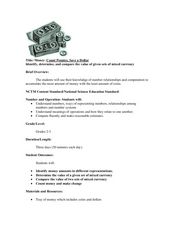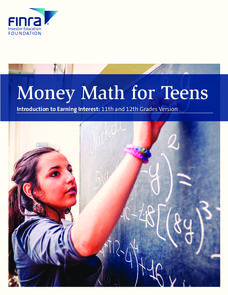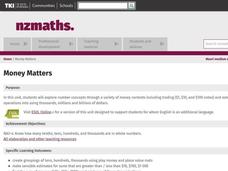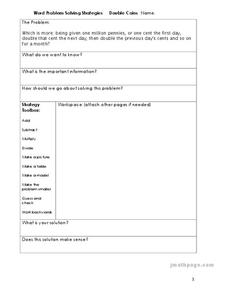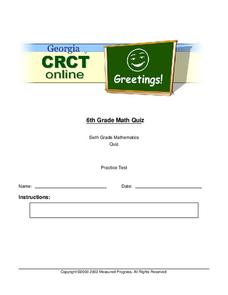Mathematics Assessment Project
A Million Dollars
Could you carry a million dollars in $1 bills? As a middle school assessment task, learners investigate different questions regarding a million dollars. They then determine how long it would take to make a million dollars, how...
Curated OER
How Would You Spend a Million Dollars?
Students plan and organize a theme to spend one million dollars. They select a theme, research prices of items on the Internet, organize the information into a spreadsheet, write an introductory paragraph, and create a final project.
Curated OER
Who Wants to Carry a Million?
Young scholars, in groups, determine the volume of a box large enough to hold a million dollars. They calculate the dimensions of a bill and the volume of the money.
Curated OER
Children's Literature Across the Curriculum Ideas-If You Made A Million
Pupils read If You Made A Million by David M. Schwartz. They complete a variety of cross-curricular activities surrounding the study of earning, saving and spending money. Included are reading, art, math, science, writing, social...
Visa
Savvy Spending: Sharpening Money Decisions
Do you really need that new laptop/phone/dress/jacket/etc.? Financial decisions require us to distinguish between our wants and our needs. Through discussion and the evaluation of scenarios on provided worksheets, this resource...
SaveandInvest.org
Introduction to Earning Interest: Middle School
Does your bank pay you for allowing them to hold your money? Class members research three different ways they can earn money using money already in the bank. Topics include certificates of deposit, statement savings accounts, and...
Curated OER
Money: Count Pennies, Save a Dollar
Learners determine how to make the largest sum of money using the least amount of coins. In this mixed currency lesson plan, students listen to a reading of If You Made a Million by David M. Schwartz before participating in money...
Curated OER
How Big is 1 Million?
In this greater numbers worksheet, students enhance their understanding of the number 1 million by answer the six word problems that use the number in various forms.
Curated OER
Double Your Money
What a creative way to delve into adding large numbers! After listening to a story called The King's Chessboard, learners estimate how much money they would have each day following instructions based on doubling and exponentially...
SaveandInvest.org
Introduction to Earning Interest: Grades 9-10
Does your bank pay you for allowing them to hold your money? The lesson covers three different ways your money can make money. Topics include certificates of deposit, statement savings accounts, and money market accounts.
SaveandInvest.org
Introduction to Earning Interest: Grades 11-12
Does your bank pay you for allowing them to hold your money? Class members investigate three different ways money can make more money. Topics include certificates of deposit, statement savings accounts, and money market accounts....
Curated OER
Who Wants to Win Millions?
Addition practice awaits your students in this engaging Jeopardy-style game. The students can earn hundreds of dollars by answering questions correctly. The categories include: Adding Doubles, Add and Find Missing Numbers, Adding 3...
Kiz Math
Who Wants to Win Millions - Addition
Some excellent practice in adding a variety of numbers awaits your class in this engaging Jeopardy-style game. They can earn hundreds of dollars by answering questions correctly. The categories include: Adding One, Two, and Three-digit...
Curated OER
Million Dollar Project
Students calculate how they will spend a million dollars. In this millionaire math lesson, students complete a worksheet and then make a poster of how they would spend a million dollars. Each item and its cost must be shown....
Curated OER
Who Wants to Win Millions - Division
Use this presentation to focus on division skills. Learners answer division questions involving one, two and three digits. There are also word problems to foster critical-thinking skills.
Curated OER
Money Matters
Third graders make fair trades and exchanges of their money in order to have practical experiences with the essential "rules" of our place value system. They create groupings of tens, hundreds, thousands using play money and place value...
Curated OER
Math Lesson: Just How Many is a "Million Dead"?
Learners are able to convert large numbers into meaningful ratios. They are able to conceptualize 1 million. Students grapple with the concept of a million. They use this activity to convey the idea of millions by converting war death...
Curated OER
Million Dollar Project
Each student is given the task of spending $1 million. The way students spend their money is dependent on a theme such as "creating a dream world," "taking a trip," or "doing something to better society." Each student researches,...
Mathematics Assessment Project
Estimating Length Using Scientific Notation
Would you rather have a million dollars or 1 x 10^6 dollars? To find the answer to this question, class members first complete an assessment task converting numbers between decimal notation and scientific notation. They then take...
Curated OER
Money Matters - Teaching About Economics
The right money lesson plans can teach students about economics in an engaging way.
Curated OER
Word Problem Solving Strategies
In this word problem strategy worksheet, 6th graders solve and complete 11 different problems and short answer questions related to double coins. First, they determine what they know and what is important information. Then, students...
Curated OER
Money Worksheet
In this personal finance worksheet, learners use their problem solving skills to calculate exchange rates and practice writing checks.
Concord Consortium
Fermi Volume
It is about this big. An assessment provides three questions on the estimations of volume. Pupils determine the quantities needed and use dimensional analysis to arrive at estimations involving dollar bills, paint, and gasoline.
Curated OER
Sixth Grade Mathematics Quiz
In this math worksheet, 6th graders complete multiple choice questions about variables, money, weight, and more. Students complete 15 questions.






